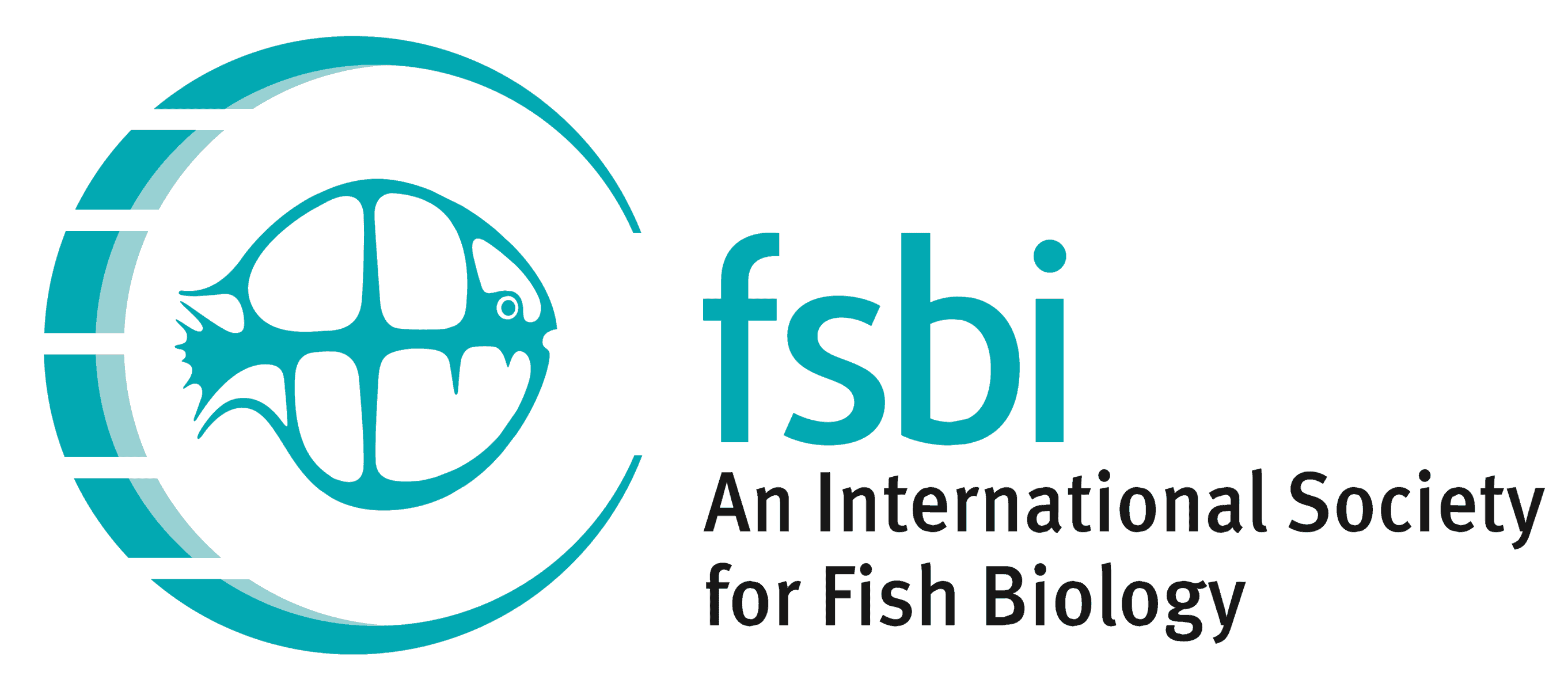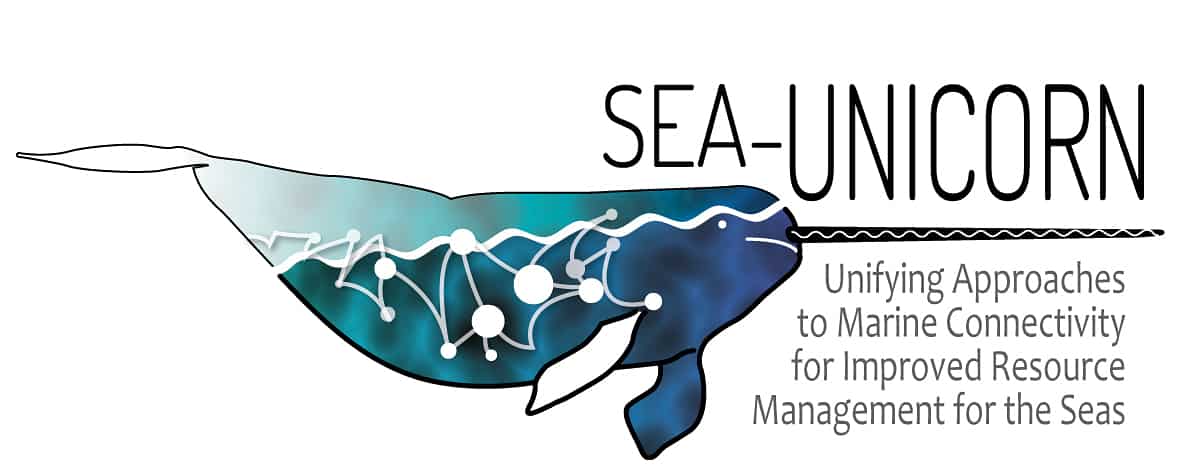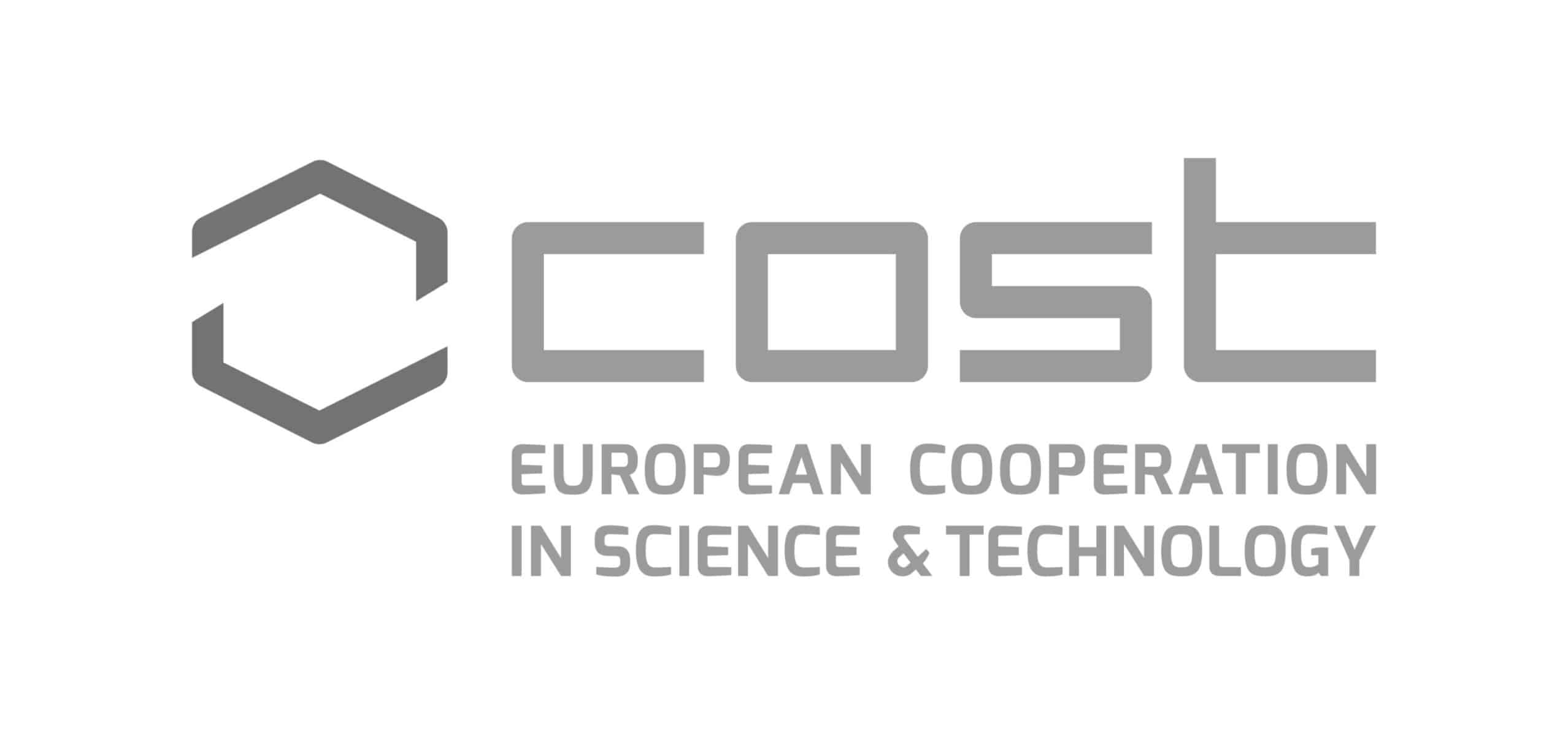FSBI 2023 Annual Symposium
Fish habitat ecology in a changing climate
24th-28th July 2023, University of Essex
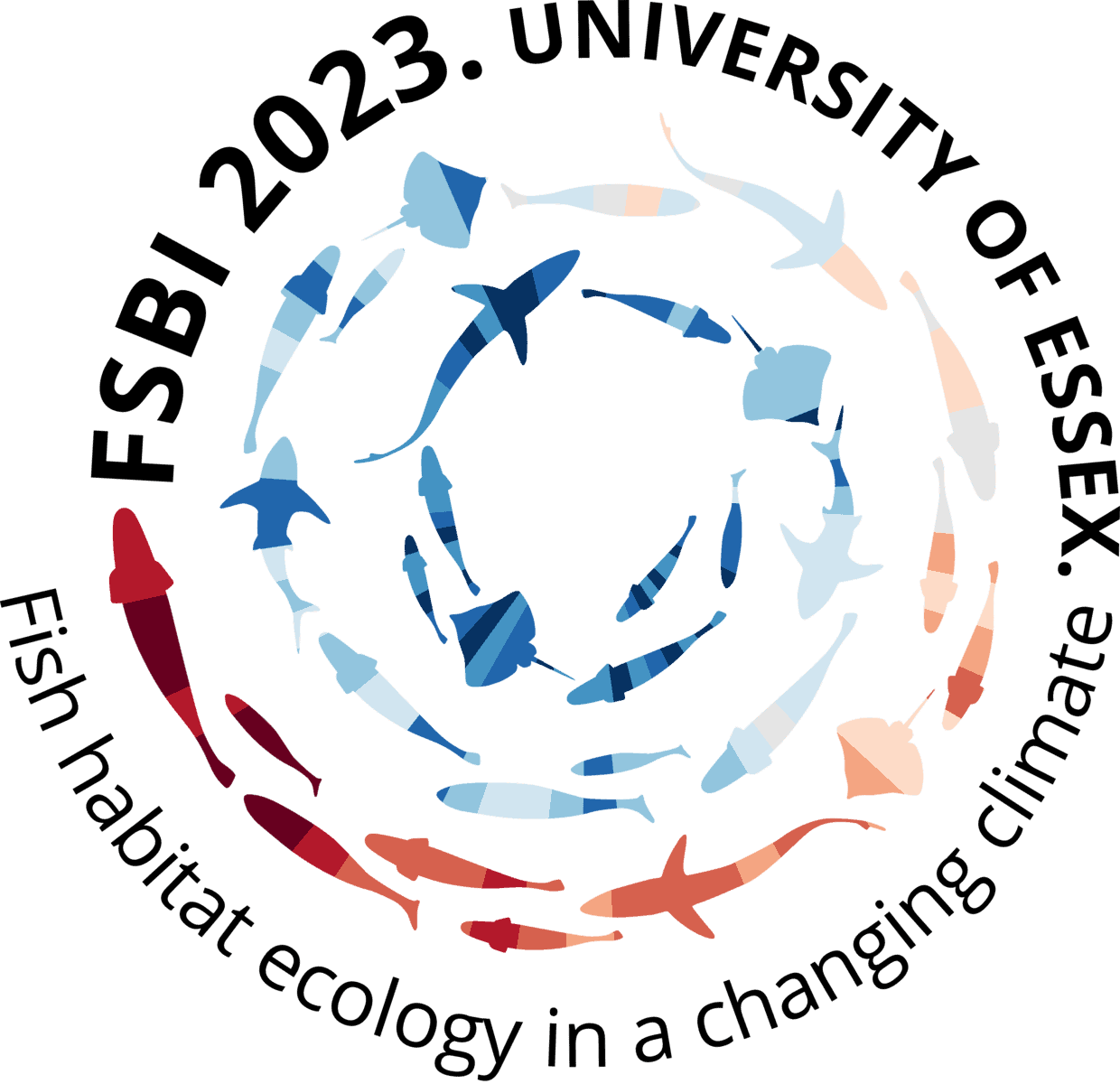
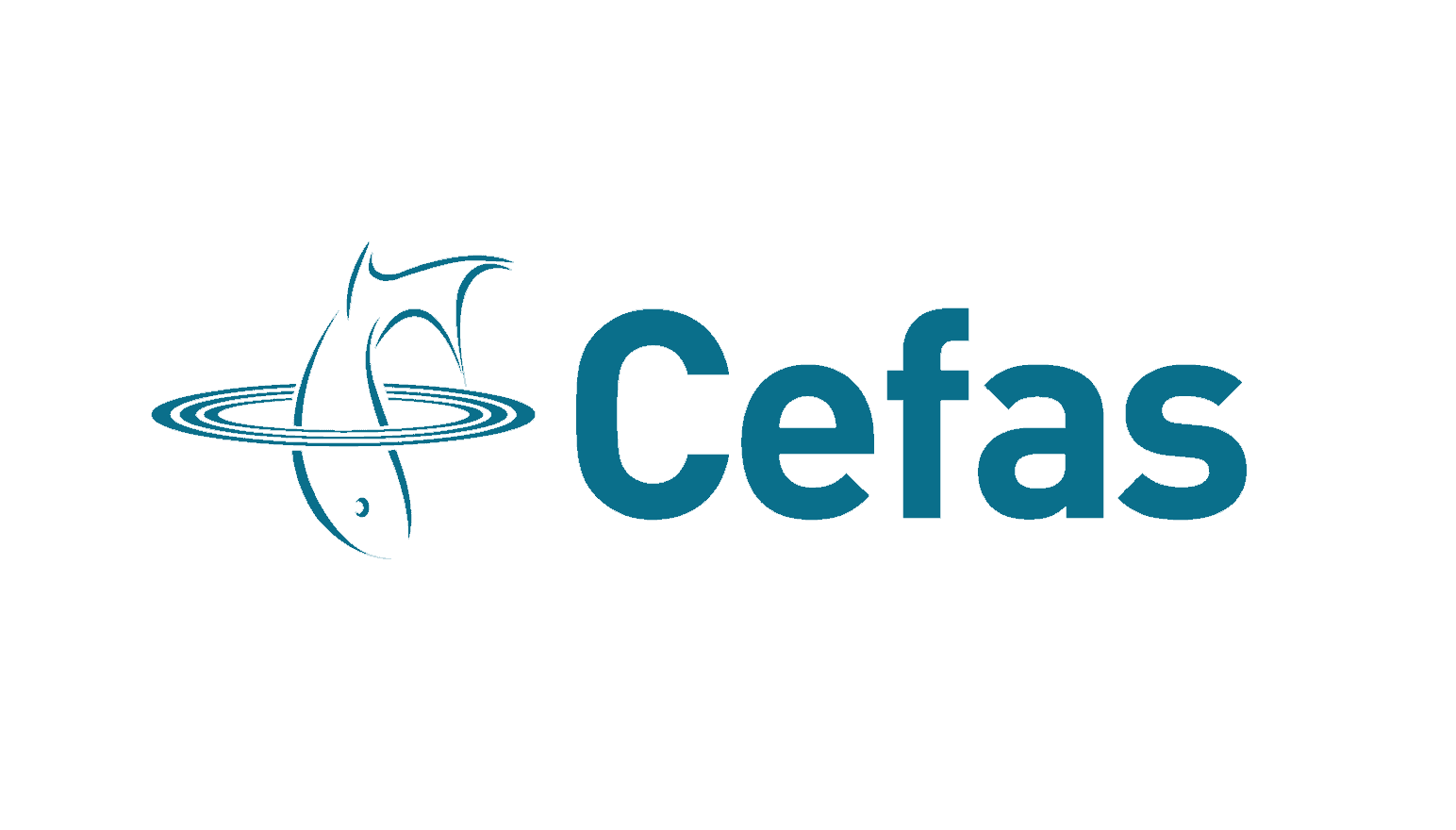
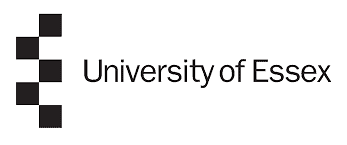
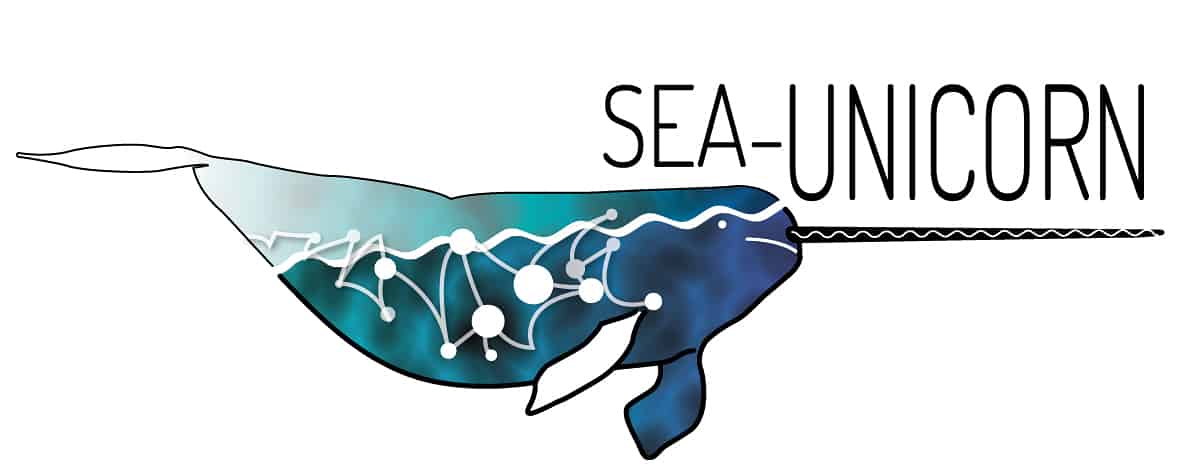
The 2023 Symposium, co-convened by the University of Essex and the Centre for Environment, Fisheries and Aquaculture Science, will present the latest science on fish habitat ecology, exploring how fish interact with their environment and how climate change and other stressors impact their behaviour, physiology, diet, and health.
The conference will bring together scientists from a range of disciplines to explore ways of integrating our research and strengthening relationships with stakeholders and policymakers to improve the effectiveness of management and conservation.
We look forward to seeing you in-person in Essex!
Background
Understanding the factors driving fish behaviour, physiology and survival is increasingly important during this period of unprecedented global change, given their implications for fisheries stability and ecosystem health. Habitat quality and quantity shape fish population dynamics and eco-evolutionary trajectories. However, quantifying the habitat needs of fish across all life stages (and of their predators and prey) is challenging, relying on diverse approaches such as field observations, laboratory experiments, genomics, chemical tracers, telemetry and modelling.
Successful integration of these data into management and policy requires open and constructive knowledge exchange between natural and social scientists, stakeholders, managers and policymakers, and new tools to analyze and visualize these complex datasets. Building this social-ecological connectivity is particularly important in dynamic boundary systems (e.g. estuaries) and for protecting species characterised by trans-boundary movements (e.g. between rivers and sea; across jurisdictional borders).
The themes of the 2023 FSBI Symposium at the University of Essex are broad and inclusive, covering fish biogeography, habitat management/restoration, social-ecological connectivity, food web dynamics and One Health. The topics all have clear links to UN Sustainable Development Goals (e.g. Climate Action, Life Below Water), and the critical roles and services that fish provide, and will attract a diverse, interdisciplinary and international forum.
Symposium Themes
Understanding and predicting future fish distributions (Tues all day)
Can we predict how fish distributions and biomass will respond to different global change scenarios? What data, experiments and tools do we need to make more accurate predictions (e.g. metabolic rate, thermal limits)?
Fish and Habitat Management (Weds am)
How can we build human social connectivity and strengthen communication between academia, stakeholders, managers and policymakers to better support fish conservation and approaches such as natural capital and nature based solutions?
Protecting and restoring critical habitats (Weds pm)
How can we better monitor, restore and protect the critical habitats supporting fish stocks across their entire life cycle, particularly when they cross ecological or management boundaries? And how does (or could) this information inform ecosystem management and spatial planning?
The role of fish in food webs (Thurs am)
What is the interplay between fish growth, movement and phenology and the structure and productivity of the wider food web? When do fish play key roles in governing food web dynamics (bottom up vs top-down control)?
One health (Thurs pm) (keynote sponsored by the Buckland Foundation)
How do stressors such as marine heatwaves, emerging contaminants, parasites and hypoxia impact fish behaviour and health (e.g. physiology, growth, fitness), and how does this impact global fish production and human health/wellbeing?
Fish movement and connectivity (Fri am) (session sponsored by SEA-UNICORN)
How do anthropogenic activities and climate change alter fish movements and connectivity patterns? And how does this impact ecosystem services and ecosystem functions?
Travel & Conference Awards
Unfortunately you have missed both deadlines for funding opportunities. However, there is one more FSBI Travel Grant round before the conference (deadline to submit an application = 1st June 2023). However - as stated previously - we cannot guarantee that applications made to this round will be considered in time for this conference. Please read the Terms & Conditions provided on this page before applying.
Congratulations to our eight recipients of this year's Conference Awards!
Matt Hatfield, Molly Kressler, Jonathan Ellis, Paul Bangura, Edel Lheureux, Ashley Townes, Kirsty Richards and Antonia Klöcker.
Key dates
Abstract submission opens: 1st December 2022
Abstract submission closes: 28th February 2023
Registration opens: 27th February 2023
Conference and Travel Award application deadline: 1st March 2023
Notification of abstract acceptance: 31st March 2023
Early bird registration closes: 1st May 2023
Late registration closes: 20th June 2023
Conference: 24-28th July 2023
Location
Beautiful grounds
The conference will be based at the lovely University of Essex campus in Wivenhoe Park near Colchester. During breaks you can wander around the spacious grounds and have a game of frisbee golf or walk/bicycle along the river to visit the historic town of Wivenhoe or Colchester.
The campus has accommodation, restaurants and bars within walking distance of the lecture theatre, making it a perfect location for an FSBI meeting. It is also only an hour from London by train, so is easily accessible nationally and internationally.
Social events
There will be lots of social events including a wine reception at the beautiful Wivenhoe House, a fish-themed quiz night, a BBQ by the lake, a movie night showing Riverwoods with a Q&A session with Chris Howard, the Executive Producer, a three course banquet with a band held at the beautiful Prested Hall, and an early morning 'spawning run'.


Excursions
Thanks to the Essex Wildlife Trust, we will have Monday morning excursions (free of charge!) to get some fresh air and hopefully also some sun. We will divide into two groups, with some visiting the River Stour in Dedham ('Constable country') to see a fish pass and others visiting the famous Essex saltmarshes!
FIND YOUR WAY AROUND
Use this map to find key locations
and/or this app to find your way around campus
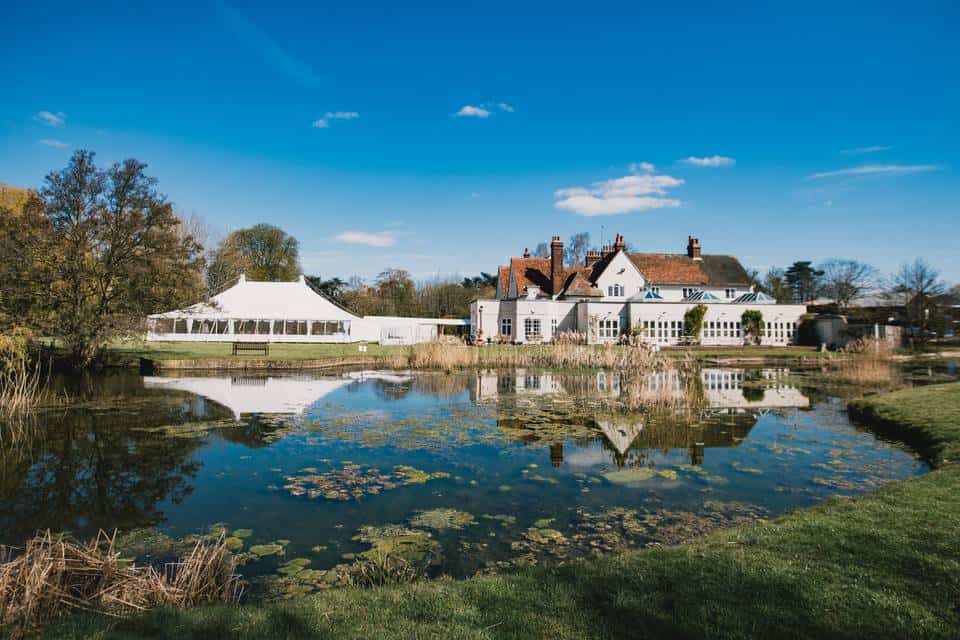

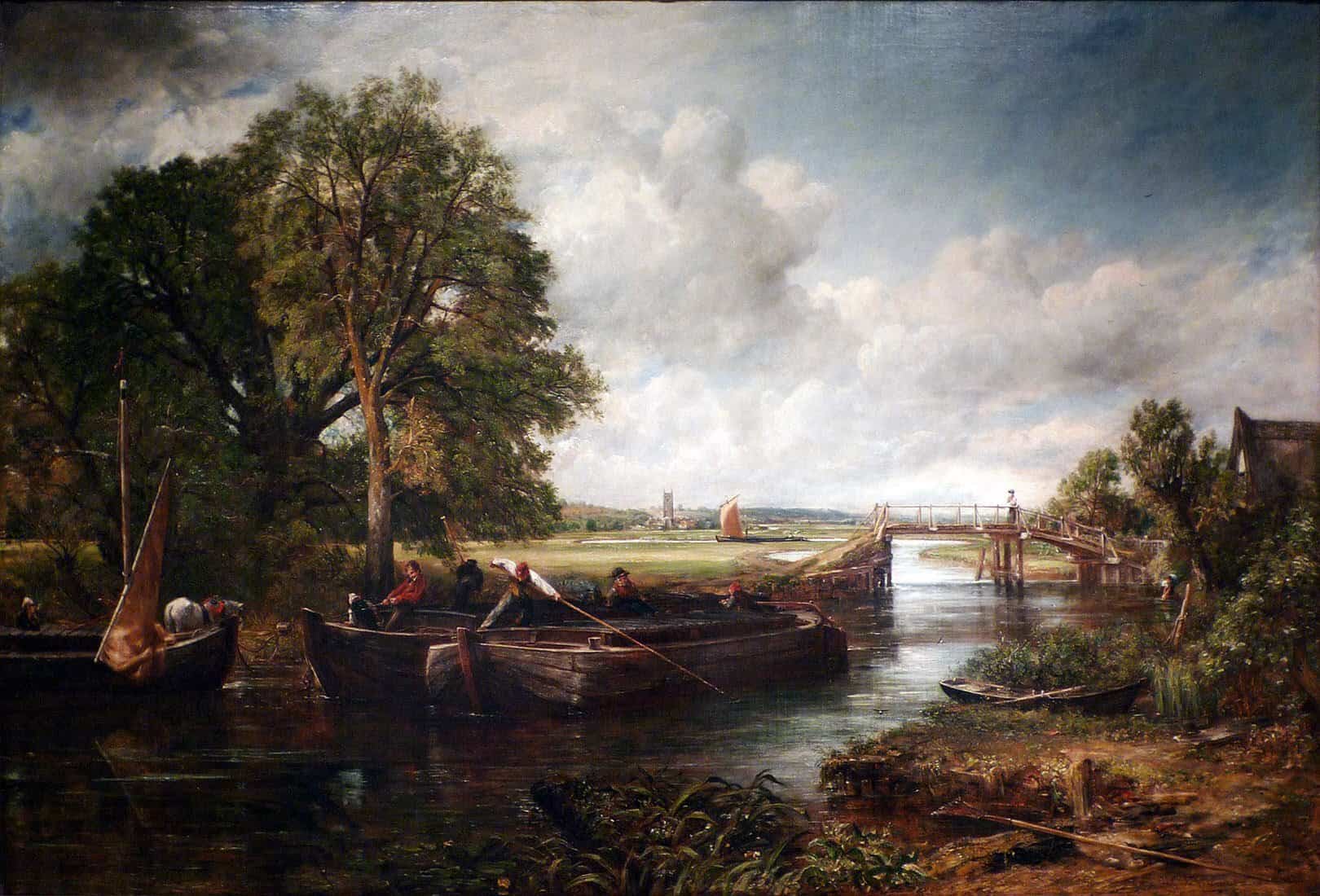
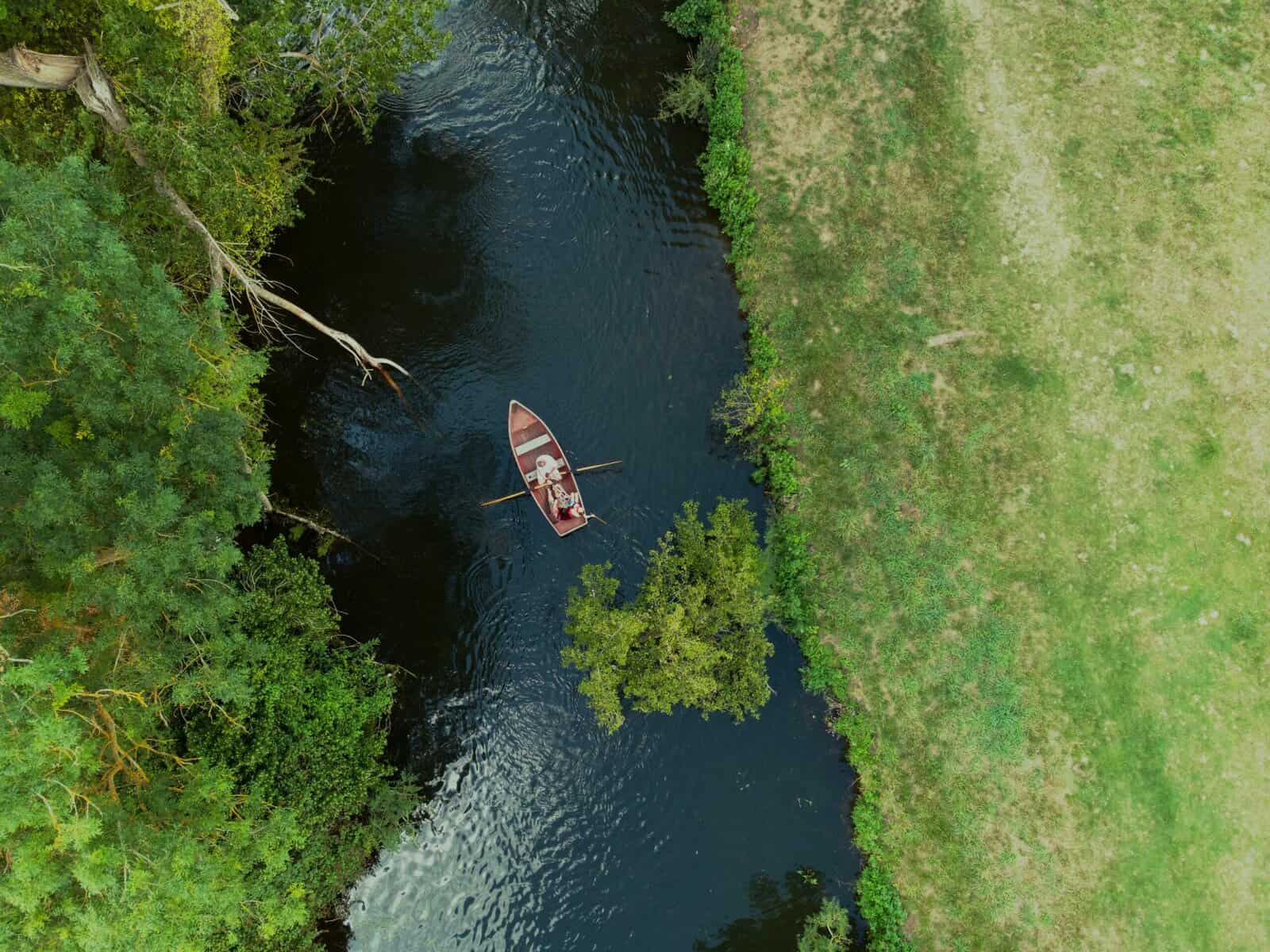

Spawning run
Inspired by the American Fisheries Society we are having an early morning run run ('Spawning Run') along the riverside on Weds morning, meeting at 06:10am at South Courts and walking down to the start point by the river for a 06:30am start. This is a fun run, but we do expect you to take it seriously by wearing appropriate clothing (e.g. decent trainers, layers, sunscreen) and to come hydrated. The route can be narrow at points so please be considerate of each other and members of the public, and be respectful and quiet on the stretch that goes through a residential area. There will be marshalls and some water halfway round (see route below) - please say a big thank you to them for joining us so early!! And finally, please read the information below, which we will also read out to you before the run. If you do still take part you are accepting that you are doing so entirely at your own risk and that it is your responsibility to ensure that you are fit and able to take part in the event.
Participants on this 5km run are doing this activity at their own risk, and the University of Essex does not accept responsibility for injury, loss and damage sustained by a participant unless the above injury, loss and damage is proven to have been caused as a direct result of negligence on the part of the organisers.
Running is a physically active sport, and - if in doubt about your physical ability - you should seek advice from your doctor before taking part.

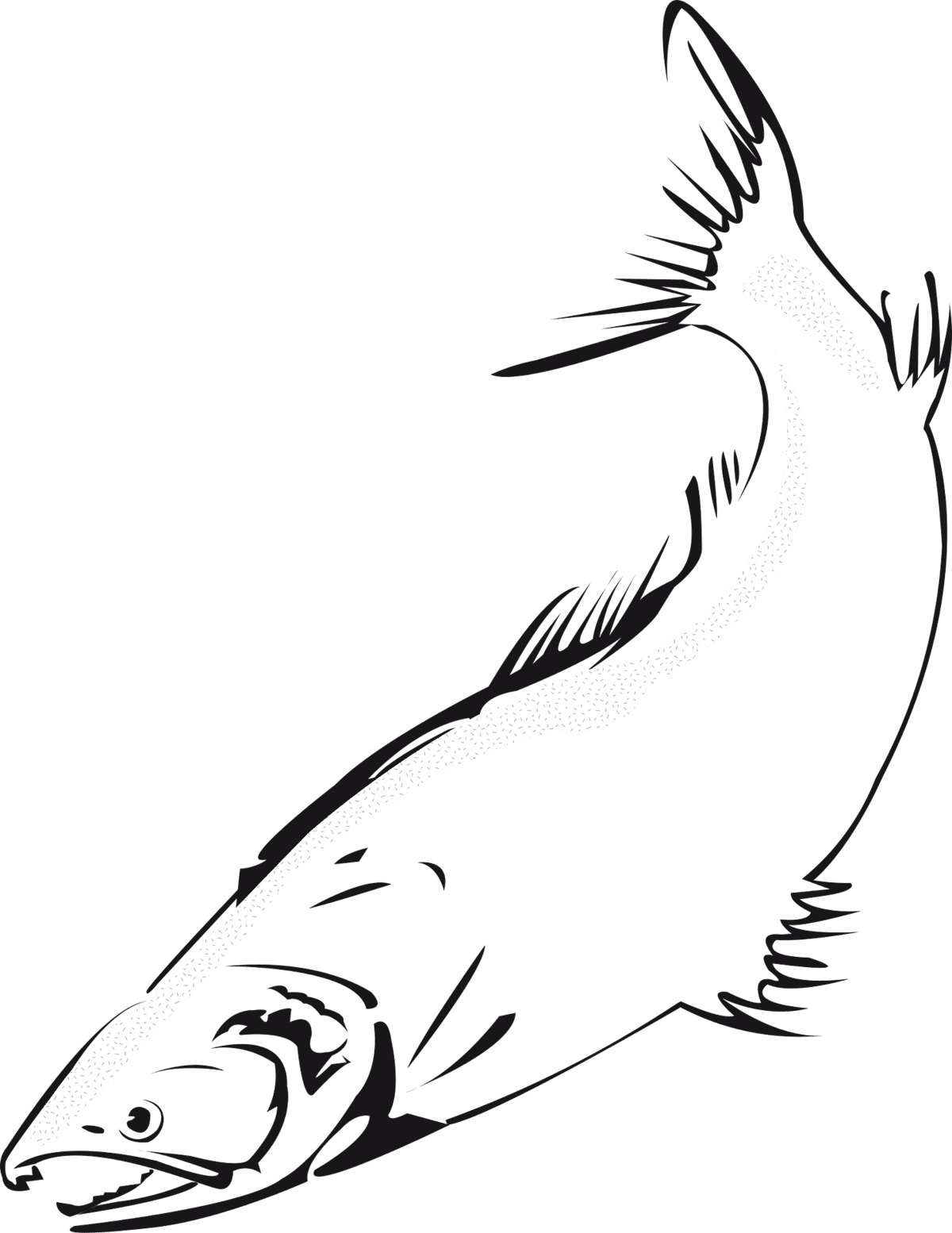
Childcare / holiday camps
If you would like to bring children with you, the wonderful Wivenhoe Park Day Nursery is about a 30 second walk from the symposium lecture theatre! During the conference they will be running a Forest School Summer Club for school aged children up to their 8th birthday. If you would like to book a place or ask any questions, please email them at nursery@essex.ac.uk or call them on +44 (0)1206 873224.
Alternatively, if your kids are more into sports or a bit older, you can sign them up to the Essex University CHUMS Multi-sport holiday camps for 5 to 14 year olds. More details and how to book given here: https://www.essex.ac.uk/sport/childrens-activities/chums-holiday-camp.
Be warned - places do fill up fast!


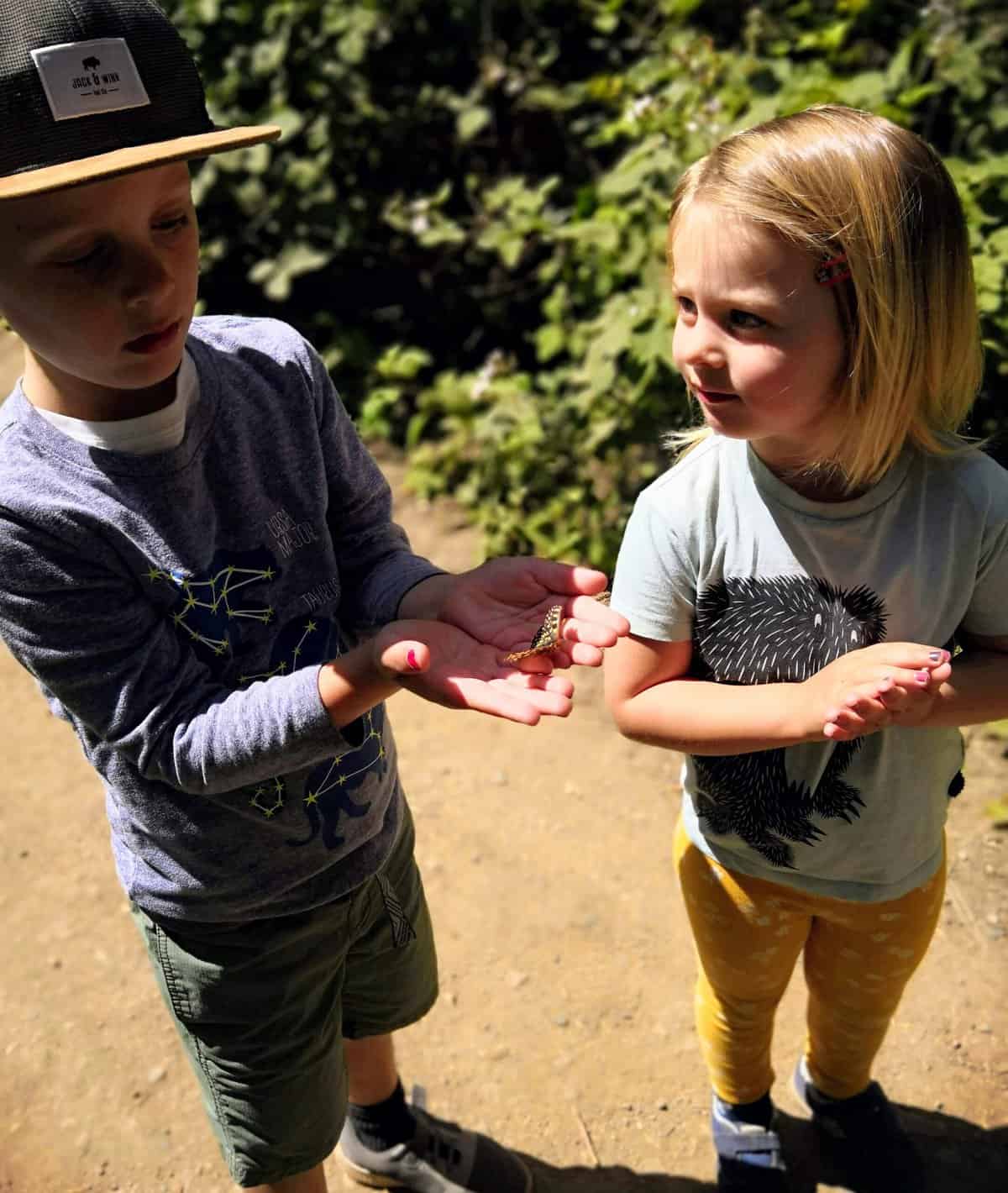
Travel information
All key locations are stored in this google map.
** Look out for train strikes that could affect travel on Sat 22nd & Sat 29th July (and first services start later the next day). Please check here for updates - https://www.greateranglia.co.uk/strikes. **
** Also look out for tube strikes that could affect travel on July 23, 25, 26, 27 and 28th July. Mon 24th July currently looking OK - https://www.telegraph.co.uk/business/2023/07/11/tube-strike-dates-july-2023-tfl-london-underground/ **
AIR
Closest airport is Stansted. (45 min drive away). Easiest transfer from Stansted, Luton and Heathrow airports is to take the National Express Bus to Colchester. Sometimes they go direct to campus - check before booking. Campus is also a short taxi or bus (S1 or 87) from Colchester Town Centre. From Gatwick Airport it is best to take a train then tube to London Liverpool Street, then a train to Colchester or Hythe and then a taxi or bus to campus.
TRAIN
The train journey from Liverpool Street takes just under an hour and you can get a bus or taxi from the station to us. Our nearest station is Hythe (Essex) which is a 20-minute walk from campus, but train services to this station are less frequent than to Colchester (also known as Colchester North). Tickets can be booked online here.
CAR
Our postcode is CO4 3SQ (for SatNav purposes use CO7 9HT which will take you to the main Wivenhoe entrance.)
When you arrive in Colchester, follow road signs to the University (off the A133) then access campus via the B1028, Colchester Road. Park in floor 2 (or 3 if 2 is full) of the multistorey car park in Visitor Car Park B unless (a) you are not staying over night, in which case park in the North Towers Car Park next to the Essex Business School, or (b) you are staying at Wivenhoe House, in which case park in front of the hotel.
TAXI
**IMPORTANT** There is no Uber in this area (sorry). So if you want a taxi you should call for one - try Panther Cabs (+44 1206 525525) or Colchester Taxis (+44 1206 585585). If you want to be dropped off at the venue (Essex Business School) ask them to drop you at the North Towers Car Park. If you are being dropped off at the campus accommodation ask them to drop you in South Courts (= Visitor Car Park B). For Wivenhoe House ask for Wivenhoe House!
BUS/COACH
First Bus provide most bus services in and around Colchester and the University. Tickets can be bought online or via their app as well as contactless payment on the bus itself.
National Express coaches run services from around the country to Colchester (drop off and pick up point is currently East Hill close to Colchester Castle) including from London and UK airports. Please note, for some journeys you may need to change buses before continuing to your destination.
Keynote speakers
JACK JONES
LECTURE
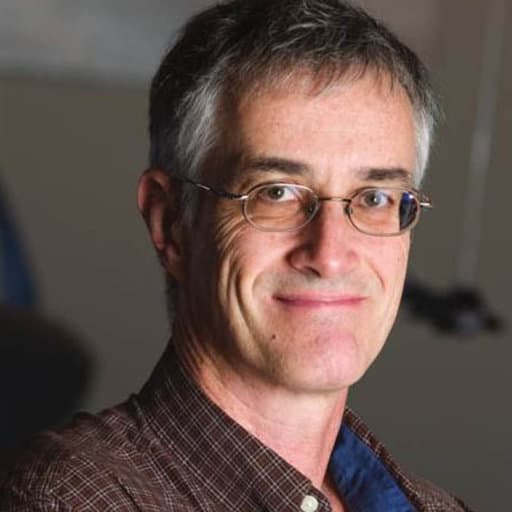
Prof. Steve Campana will talk about some of his recent work quantifying and predicting fish redistribution and growth effects in response to climate change over the past 1000 years, both in freshwater and marine systems.
Prof. Steven Campana worked as a Senior Scientist at the Bedford Institute of Oceanography in Canada for 32 years, where he headed both the Otolith Research Laboratory and the Canadian Shark Research Laboratory. He is now working as a Professor at the University of Iceland, where he leads an active research program on the population dynamics of bony fish and sharks, with particular emphasis on climate effects, age determination, satellite and acoustic tracking, and the development of new otolith-based applications.
FISH CONNECTIVITY
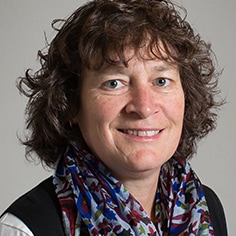
Prof. Bronwyn Gillanders will discuss her work estimating the movements and connectivity patterns of fish across a changing seascape. Her session is sponsored by SEA-UNICORN (COST Action CA19107).Prof. Bronwyn Gillanders
Professor Bronwyn Gillanders is based in the School of Biological Sciences at the University of Adelaide, Australia. She completed her BSc at the University of Canterbury (New Zealand), MSc at the University of Otago (NZ) and PhD at the University of Sydney (Australia). She has previously held three ARC Research Fellowships and is now a Faculty member at the University of Adelaide. Her research focuses on freshwater, estuarine and marine systems addressing fisheries, ecological and environmental questions. She uses calcified structures of aquatic organisms (otoliths, shells, teeth, and vertebrae or other bones) as innovative tools to understand past environments, population structure and biological processes, such as age, growth and movement patterns. Her most recent work is using portfolio effects as a conceptual model to characterise sub-population variation in migratory strategies of estuarine fish. She is past president of both the Australian Society for Fish Biology and the World Council of Fisheries Societies.
FISH IN FOOD WEBS
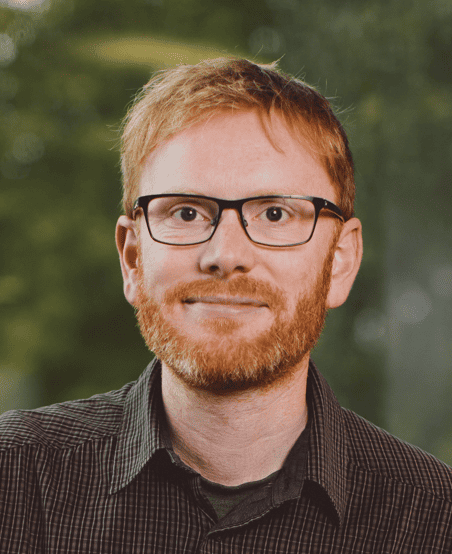
Dr Eoin O'Gorman will discuss his work using manipulative field experiments to disentangle the direct and indirect effects of warming on freshwater food webs.
Dr Eoin O’Gorman completed his degree in biological sciences and PhD in marine ecology at University College Cork, with Mark Emmerson as his PhD supervisor. He secured a 2-year Irish Research Council fellowship at University College Dublin before moving across the pond to Queen Mary University of London for a post-doc with Guy Woodward, where he first started working on the Hengill geothermal system in Iceland – the subject of his keynote talk. He went on to a 5-year NERC fellowship at Imperial College London before securing a lectureship at the University of Essex, where he has been based since 2019. His research is focused on understanding the impacts of global change across multiple levels of biological organisation in marine, freshwater, and terrestrial ecosystems. He seeks simple rules that lead to stabilising structures, with a focus on body size as a key functional attribute that drives interactions and self-organisation in food webs.
FISH AS FOOD
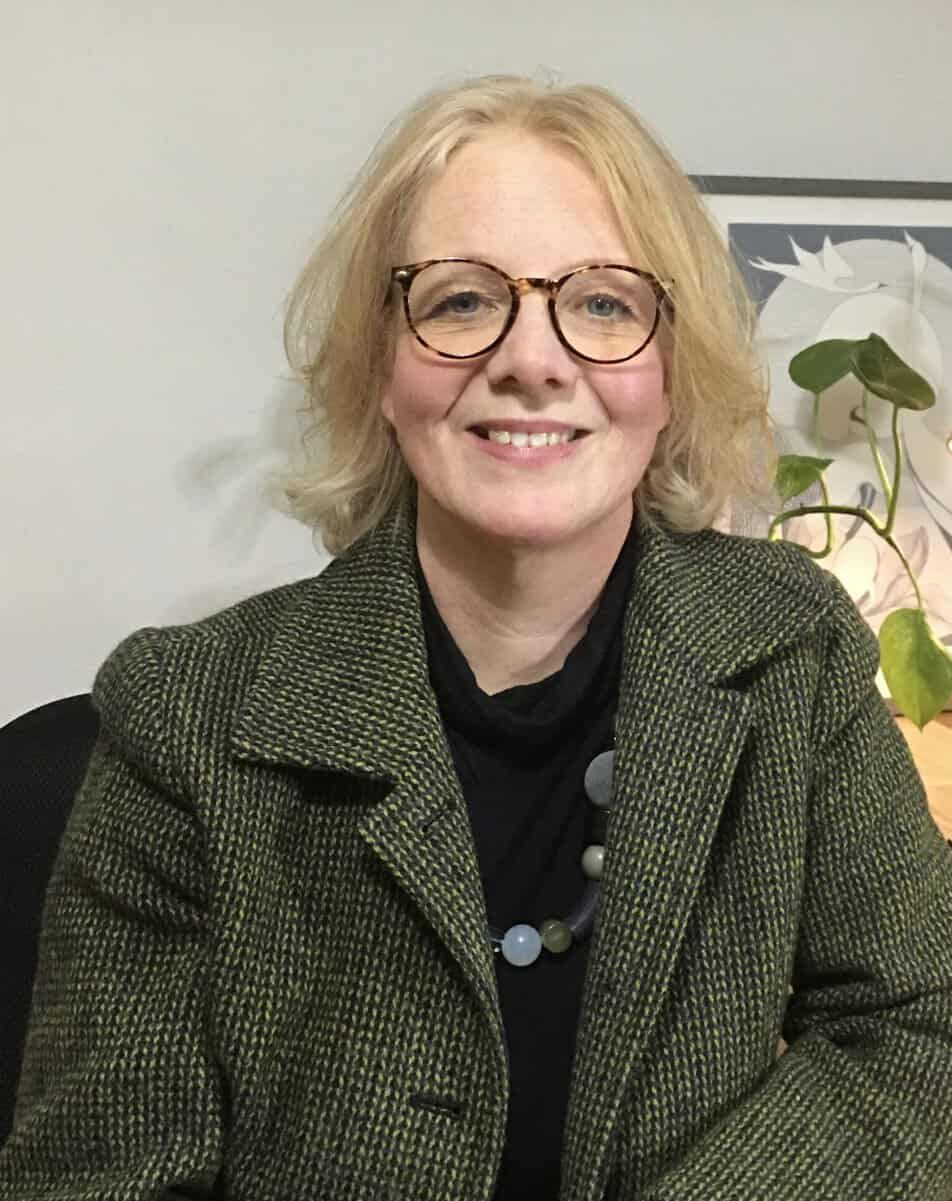
This year’s Buckland Professor, Baukje de Roos, will be talking about fish as food, and their importance to human nutrition and health. She will be sponsored by the Buckland Foundation.
Baukje de Roos is a Professor of Nutrition at the Rowett Institute at the University of Aberdeen. She has >25 years of experience in the design and delivery of human dietary intervention studies. Her research focusses on precision and personalised nutrition, and the modelling of healthy and sustainable food systems, with a special focus on seafood. Her Scottish Government-funded research program investigates how production and supplies can be better aligned with consumption and dietary recommendations in the UK’s seafood chain, as well as relationships and trade-offs between ‘healthiness’, ‘carbon footprint’, and ‘cost’ to identify the most important potential food switches in real-time UK diets. Her expertise in the area of diet and human health has formed the basis of multiple contracts and consultancies with large food companies, food levy boards, the food and drink support sector, and national UK television.
FISH BIOGEOGRAPHY
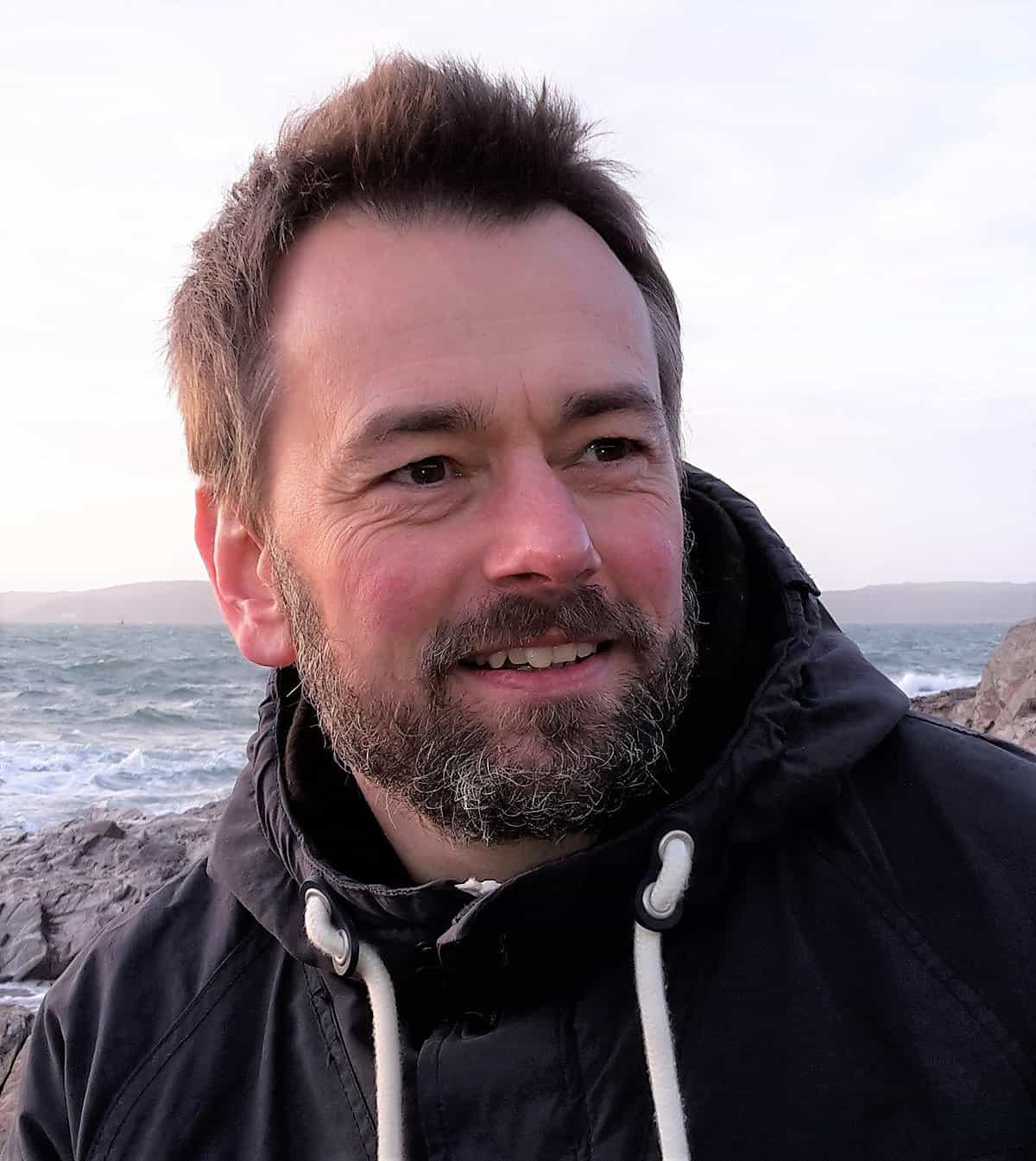
Prof. David Sims will discuss his latest shark tagging data, linking fine-scale movements and habitat use measurements to global biogeographic patterns and the impacts of interacting anthropogenic threats.
Professor David Sims is a Senior Research Fellow at the Marine Biological Association (MBA) Laboratory in Plymouth, and Professor of Marine Ecology at the University of Southampton’s National Oceanography Centre Southampton (NOCS). His research focuses on behaviour and movement ecology of sharks, a main aim being to understand how movements, habitat use and spatial re-distribution patterns are influenced by environmental changes and anthropogenic impacts and the consequences for threatened species conservation. He obtained some of the first long-term trackings of sharks using satellites and initiated and leads the Global Shark Movement Project involving more than 150 scientists from 26 countries (www.globalsharkmovement.org). He has authored over 200 scientific papers including numerous articles in Nature, Science and PNAS. He is the recipient of research awards including the FSBI Medal (2007), the ZSL Marsh Award for Marine Conservation (2019), and an ERC Advanced Grant (2020).
POLICY & PROTECTION
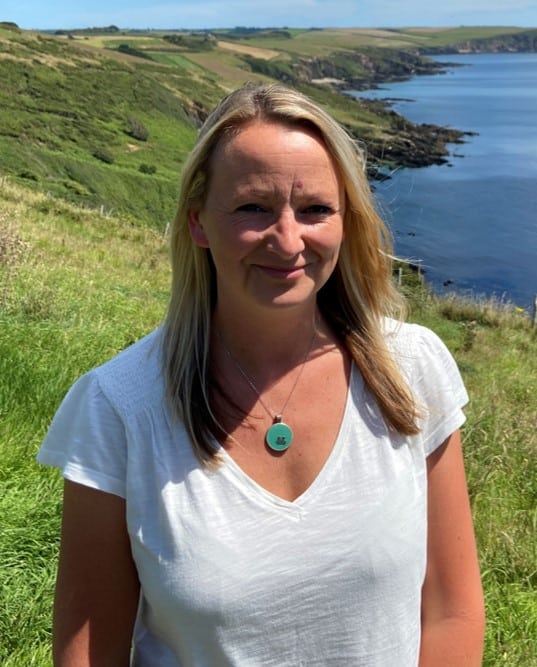
Dr Emma Sheehan will discuss the role of Marine Protected Areas to support sustainable fisheries and conservation goals in the face of climate change, and some of the processes and stakeholders involved in habit management.
Dr Emma Sheehan is an Associate Professor of Marine Ecology at the University of Plymouth. Her research is focused on Marine Protected Areas (MPA), spatial fisheries management and emerging blue industries such as marine renewables and offshore shellfish aquaculture, that if managed to exclude destructive human practices, have the potential to restore the health and functionality of biogenic habitats. To inspire and inform ambitious marine policy and management, Dr Sheehan leads the applied Marine Ecosystems Research unit (https://www.plymouth.ac.uk/research/applied-marine-ecosystems-research-unit/amer) that develops and utilises non-destructive techniques to assess the effectiveness of spatial management for species and habitats over large spatial and temporal scales.
CRITICAL HABITATS
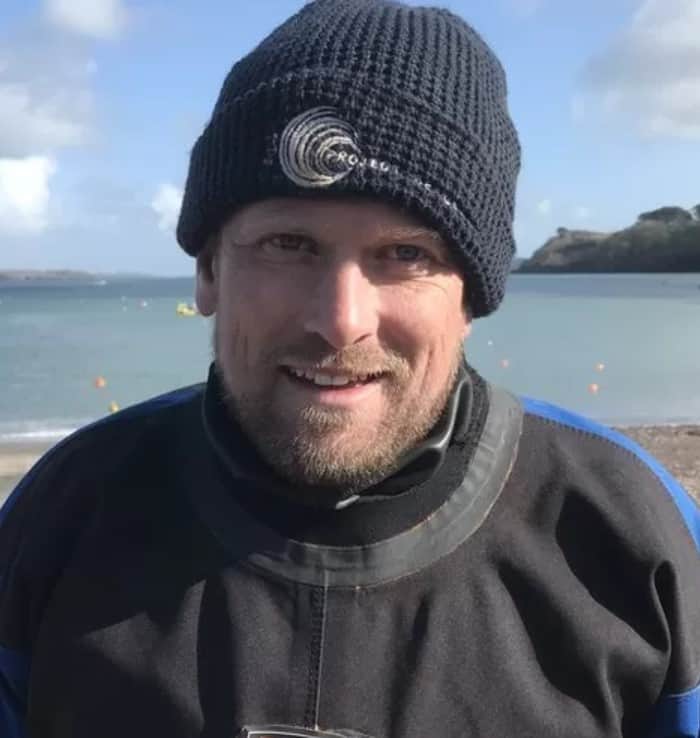
Dr Richard Unsworth will be discussing the importance of seagrass meadows to fish, fisheries and other ecosystem services.
Dr Richard Unsworth’s passion lies in understanding the ecological structuring processes of marine systems and the implications of these systems for society. This focuses primarily on the interrelationships between foundation species, habitat, and associated productive fauna (mainly fish). He is particularly interested in the consequences of cross-scale environmental changes on seagrass meadows functioning and the implications of this for global food security and other ecosystem services. Richard is the vice-president of the World Seagrass Association and a founding director of Project-Seagrass and continues to work as a senior scientist at SeagrassWatchHQ.
FISH ON FILM: BANQUET SPEAKER
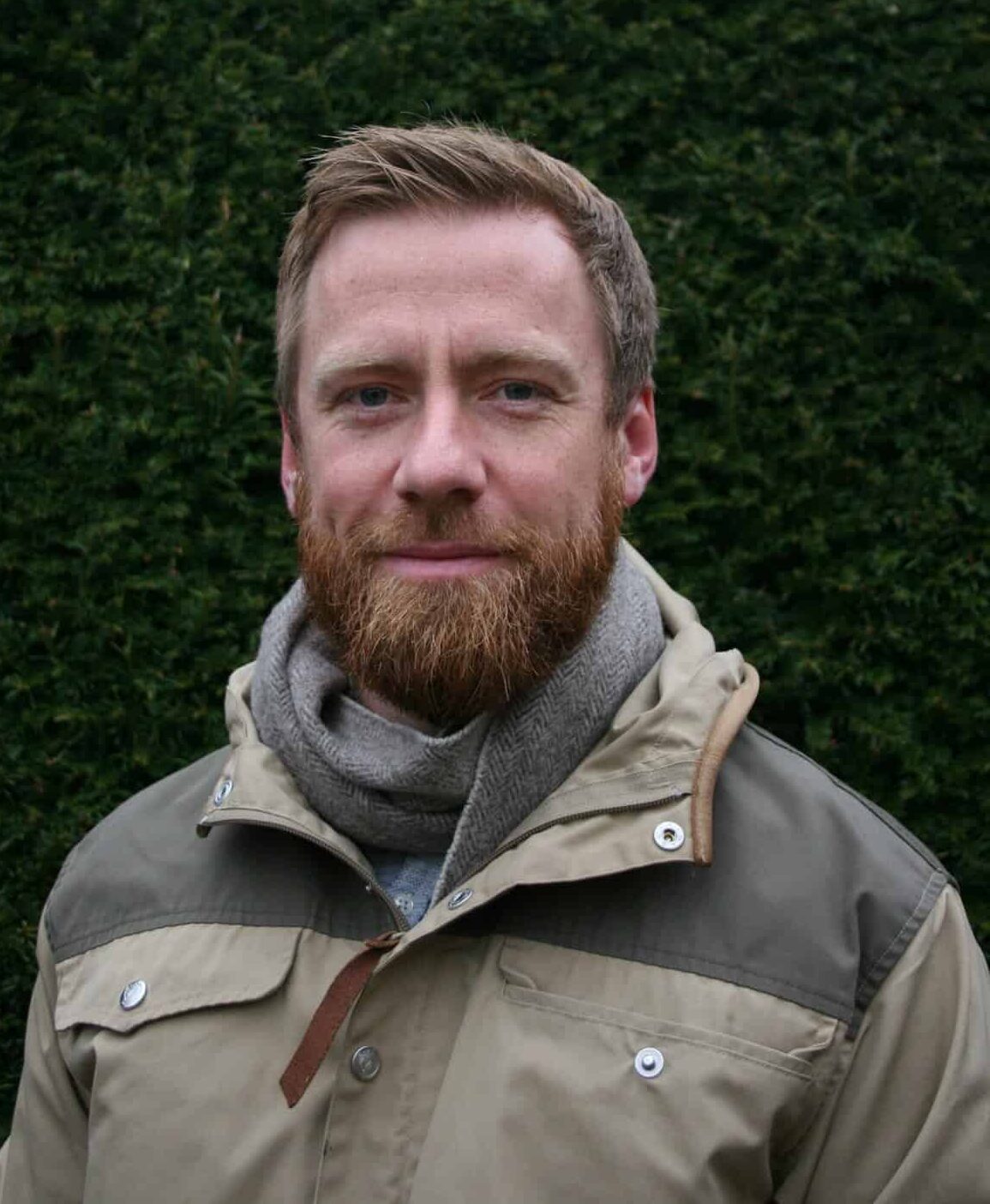
Chris will talk about the importance of film, science and storytelling in animal conservation through his salmon-focused Riverwoods documentary, his fishier moments on Springwatch, and Wild Isles with Sir David Attenborough
Chris Howard is Executive Producer of 'Riverwoods' - an ecological tale about salmon and their interconnectivity with the landscapes that they migrate through - and Director and Producer at Silverback Films. After attaining his Zoology BSc at the University of Edinburgh, started working at the world-famous Natural History Unit in Bristol. He worked on several BBC children’s series before landing his dream job on ‘Springwatch’. He worked his way up through the ranks, working on live productions such as ‘Planet Earth Live’, ‘Big Cat Live’ and ‘Big Blue Live’, before taking two years in London to work in the Science Unit and on a 3D film about pterosaurs with Sir David Attenborough. He then returned to Bristol, leading the development and launch of the BBC’s first natural history YouTube channel before eventually returning to his spiritual home as producer then series producer of the Springwatch family.
Programme
Note that due to the sheer volume of abstracts submitted (which is great!) we moved the excursions to Monday morning (09:30-13:30) and are now offering an opportunity to play the "DiadESland" board game - also on the Monday morning but a little later (11:00-13:00). More details below. Places on the excursions and game will be allocated on a first-come, first-served basis via the conference registration page.
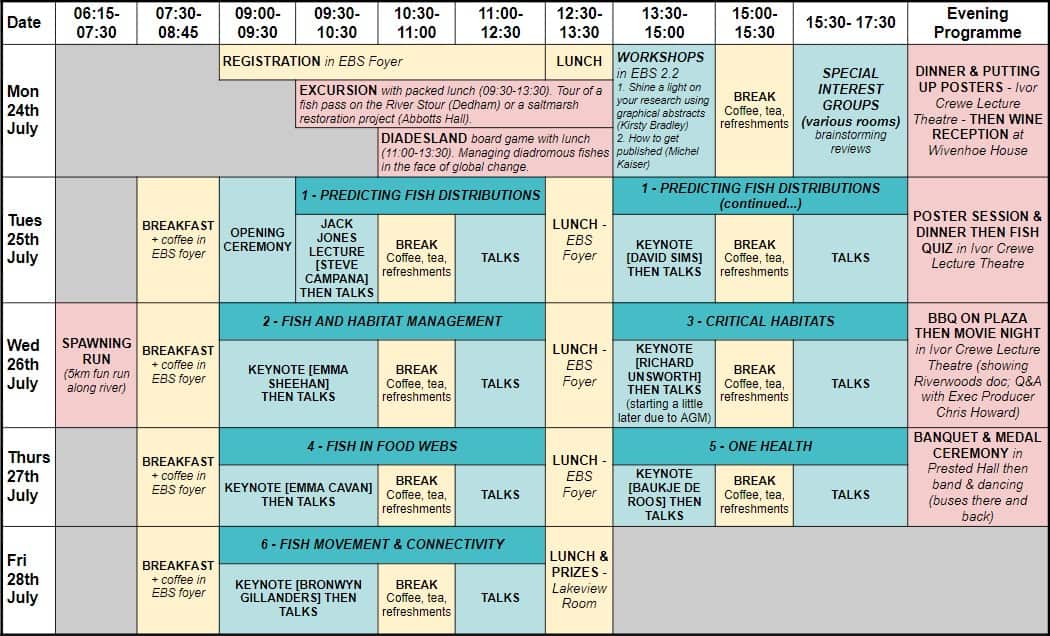
Monday optional activities
- Excursion
We are happy to announce that we will be running two free-of-charge excursions - one salty and one fresh on the Monday morning from 09:30 to 13:30! Places will be allocated on a first come first served basis when you register.
Darren Tansley from the Essex Wildlife Trust will take one group to Dedham Mill to visit a fish barrier and fish pass (see the Essex Fish Migration Roadmap), while our very own Dr Tom Cameron will take a second group to visit the Essex Wildlife Trust's Abbots Hall coastal nature reserve to explore natural and created saltmarshes and discuss their use as fish nursery sites.

- DiadESland
(#DiadESproject)
We are excited to announce that from 11:00-13:30 on the Monday morning, Dr Tea Basic (Cefas) will be running the fun and educational board game “DiadESland” for up to 30 players. Lunch will be provided as you play. Places will be allocated on a first come first served basis when you register.
This game aims to create a fun environment to ignite discussions on diadromous species management in a changing climate. The DiadES project was funded by the European Programme Interreg Atlantic Area and aims at assessing and enhancing the ecosystem services (benefits to humans) provided by diadromous fish species and develop management recommendations in a climate change context. The resulting board game "DiadESland" helps to foster discussions on managing diadromous species at large spatial and temporal scales, including the effect of global change on fish populations. You do not need to be an expert to play, this game is aimed at all fisheries stakeholders, including policy or decision makers, environmental and conservation officers, fishers or sellers, researchers and students. The game will be hosted by trained Games Masters who will support you through the process.

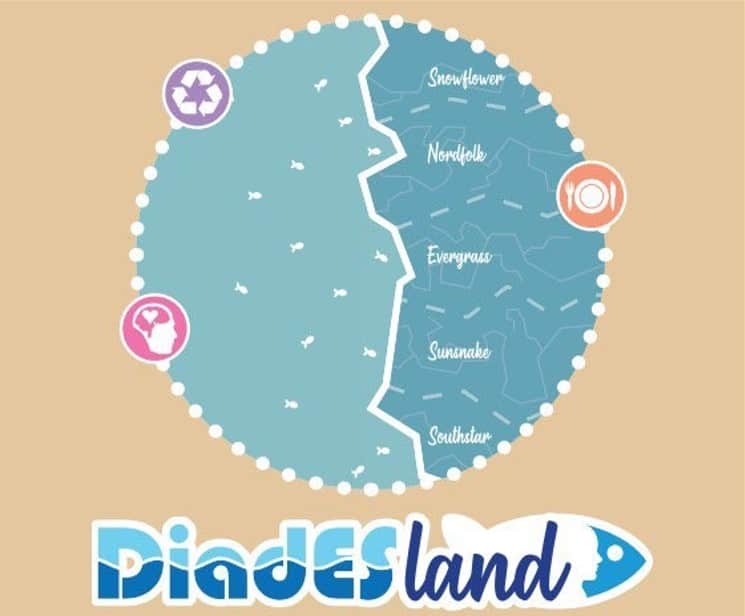
- Workshops & Special Interest Groups
On the Monday afternoon we will have two workshops (Shine a light on your research using graphical abstracts by Kirsty Bradley and How to get published by Michel Kaiser) and show a short video "Fishing for exposure: tips on how to promote your research on Twitter" by Will Perry. We will also have a number of "Special Interest Groups" for delegates to brainstorm 'hot topics' in fish research to seed syntheses for the Journal of Fish Biology Special Issue that will accompany this meeting. When you register you will be given the opportunity to register your interest for one of the themes (Connectivity; Predicting fish distributions; Food webs; Critical habitats; One health). When we are there you are also more than welcome to come up with your own ideas! During the conference we will provide opportunities for participants to form collaborative networks, discuss recent findings and debate where future research priorities should be targeted. The symposium itself will provide diverse and quality presentations to stimulate discussions and authors are expected to exchange contact details and finish review papers after the conference has ended. Please contact David Murray (david.murray@cefas.gov.uk) if you have any questions.
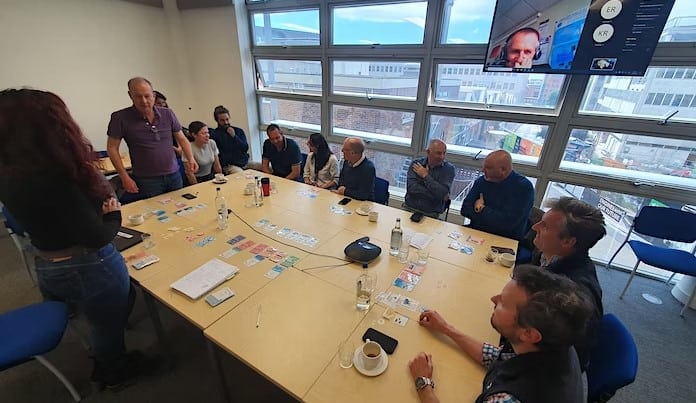
Special Issue of the Journal of Fish Biology
The Call for Papers for the JFB Special Issue accompanying this symposium is now open!
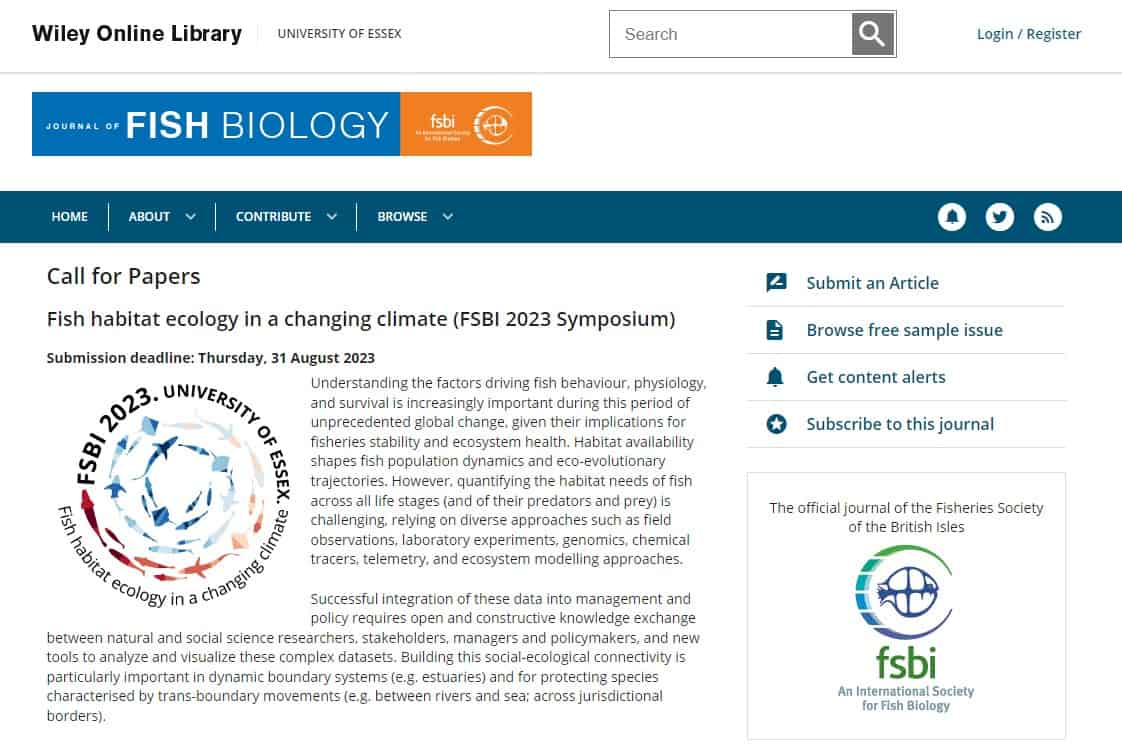
Registration / Accommodation
Please see below for the registration link and a table explaining the costs for the week or by day. Note that you can apply for FSBI membership via this page.
When you register, please read the 'included in cost' column carefully as webshop transactions are not refundable. The All Inclusive 5-day option includes everything (breakfast, lunch, dinner, refreshments, accommodation, excursion and banquet). These rooms have run out now and are no longer available via our webshop, but email us on FSBI2023@essex.ac.uk if you would like this option and we will see if we can find you one. The university flats are about a 5 minute walk from the lecture theatre. They are a basic, single occupancy standard room (see image on right) with an en suite shower and toilet, and a shared kitchen on each floor.

The Full Event Access 5-day option includes all the above except accommodation & breakfasts. Other accommodation options in the area include Wivenhoe House, The Flag, Best Western The Rose & Crown Hotel, St Nicholas House, The Black Buoy Inn and The Red Lion. You will need to book directly with them.
If you pay by day (All Inclusive or Full Event) and wish to attend the Thursday night banquet you will need to also pay the banquet surcharge.
If you would like to extend your stay in the university accommodation to Friday 28th July for Bed & Breakfast please book directly with Events Essex via their email address (eventessex@essex.ac.uk). Again, these come on a first-come, first served basis. Unfortunately all campus rooms for Sunday 23rd July have now run out.
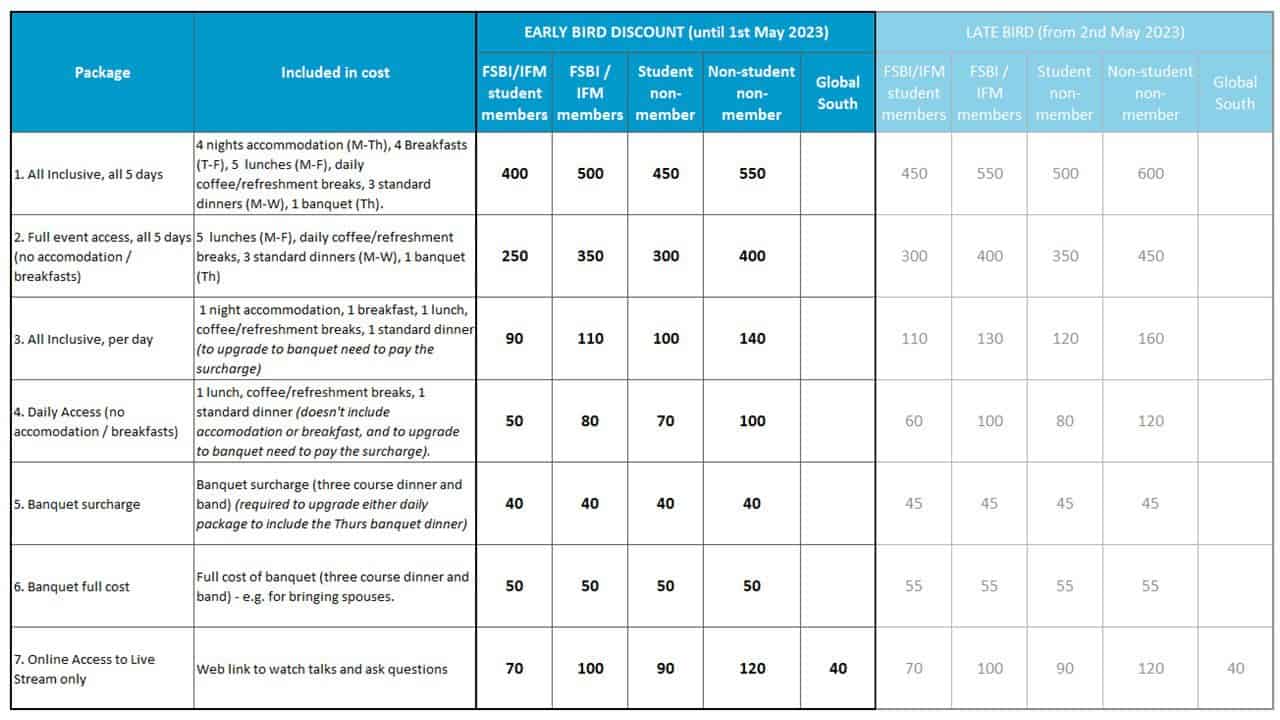
Congratulations to this Year's FSBI Medal Winners
Each year, the FSBI awards medals for lifelong individual contributions to fish biology and/or fisheries science, with a focus on ground-breaking research; for lifelong individual or team contributions to conservation, training or public understanding of the disciplines; and for individual exceptional advances in early career within these disciplines.
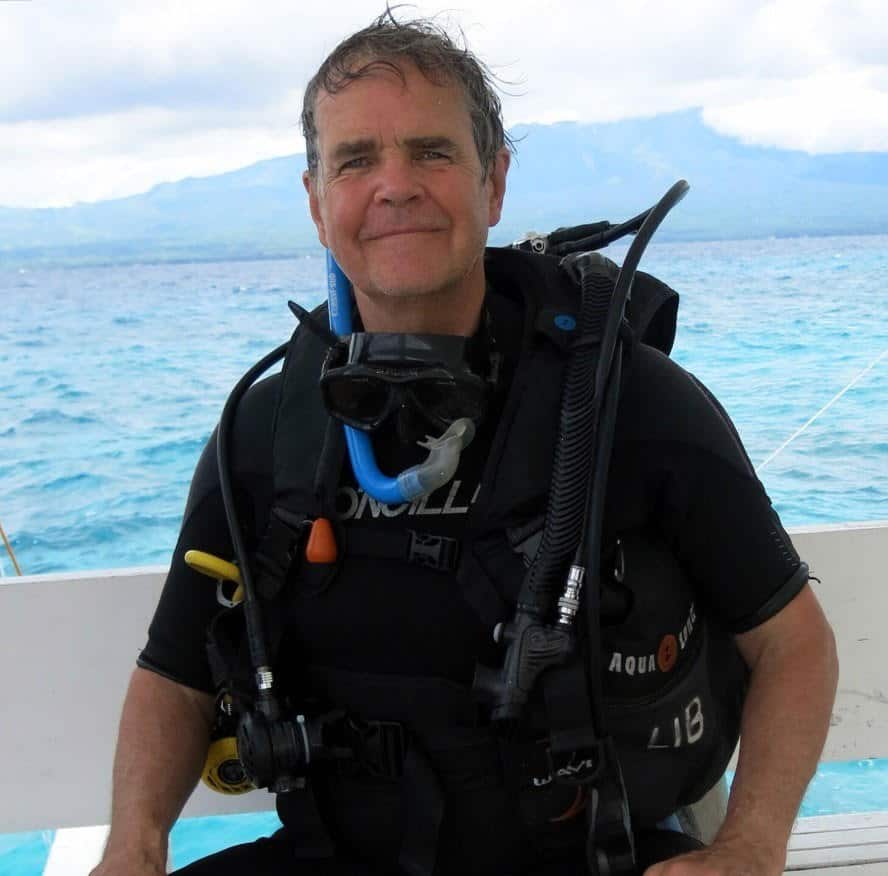
Beverton Medal
Prof Nick Polunin
The Beverton Medal is awarded in recognition of ground-breaking research and lifelong contribution to the study of fish and fisheries science.
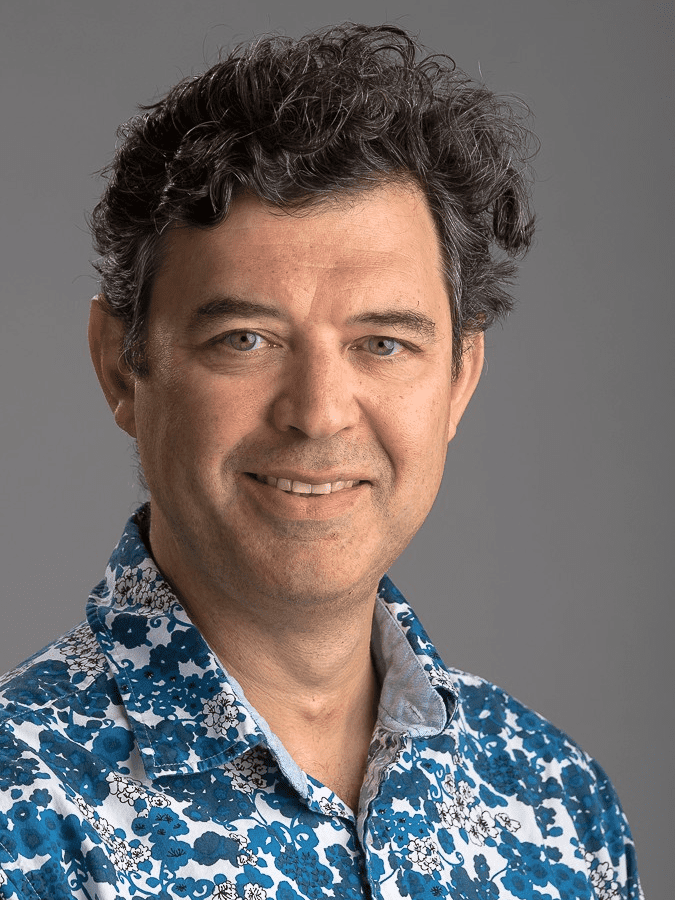
Le CREN MEDAL
Prof Nicholas Dulvy
The Le Cren medal is awarded to one or more individuals who have made a lifelong contribution, with a focus on conservation, training or public understanding.
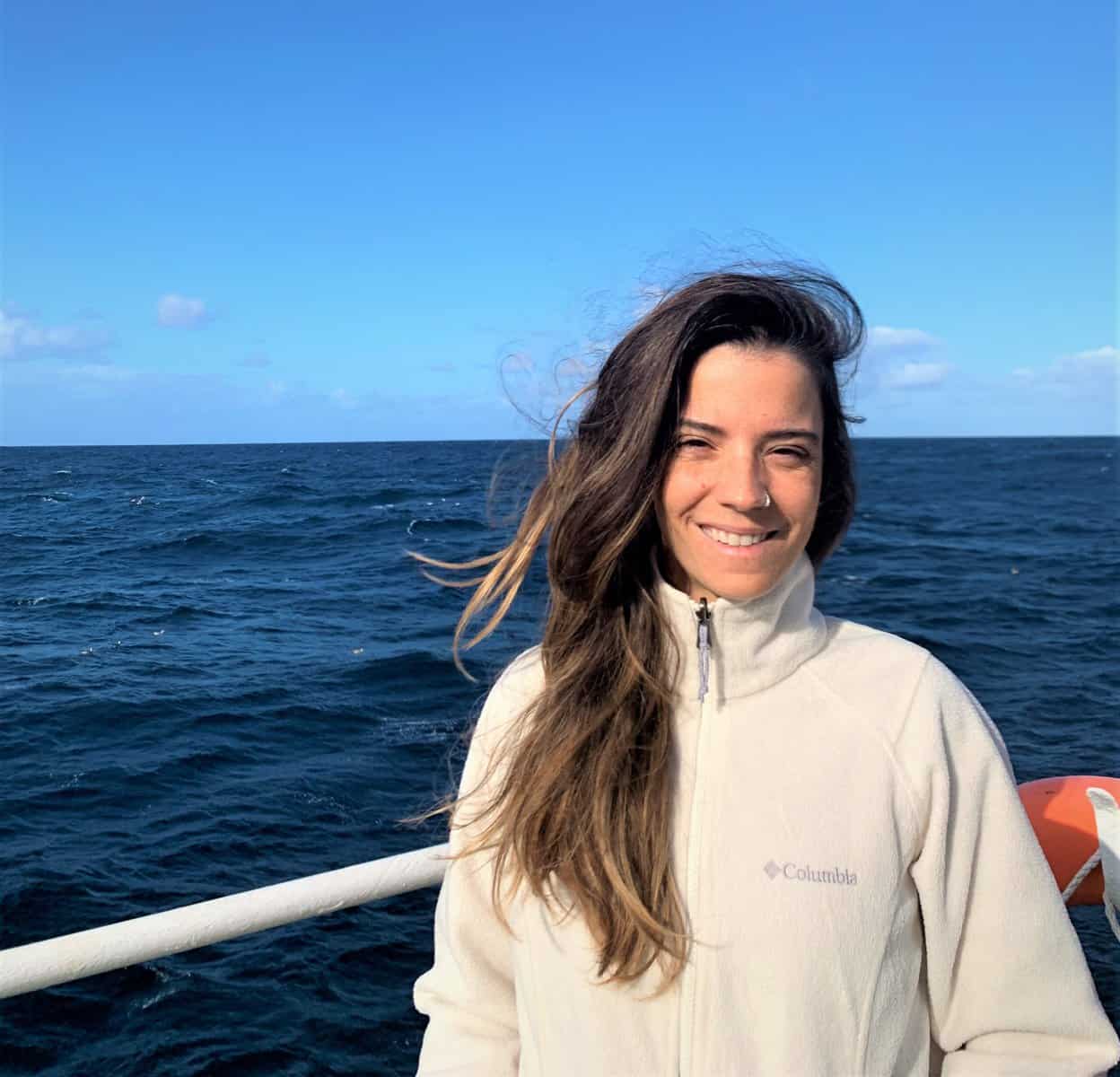
HUNTINGford MEDAL
Sofia Graça Aranha
The Huntingford medal is awarded to a member of the society with the most impactful paper in the Journal of Fish Biology.
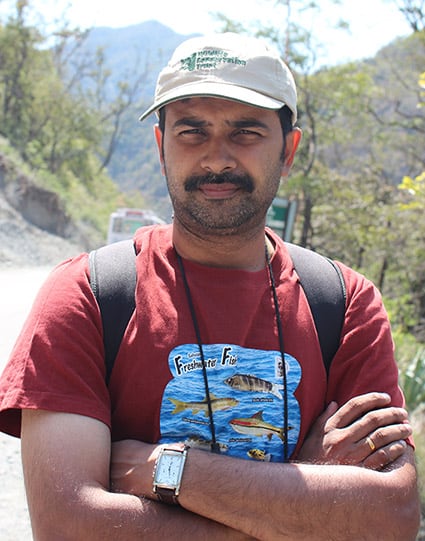
FSBI MEDAL
Dr Rajeev Raghavan
The FSBI medal is awarded to an early career scientist who is deemed to have made exceptional advances in the study of fish biology and/or fisheries science.
Posters
A poster consists of easily read text and graphics describing the objectives, methods, and findings of your study.
Preferred format = Portrait A0 size paper (841mm wide x 1189 mm high or 33.1 inches x 46.8 inches).
If you prefer landscape or a smaller portrait sized poster, go for it. But the key criteria is that the width cannot be greater than 860mm (34inches).
Posters should be a single sheet of printable stock that can be affixed to the display board using velcro stick ons that we will provide.
Posters should ideally be put up between 5pm and 7:30pm Mon (but you can also put them up on Tues prior to the start of the poster session at 5:30pm Tues).
Speed talks
These are 3 minute presentations (we will be strict on time!)
THREE slides maximum! One is also fine!
May include Q&A panels with other speakers in your mini-session afterwards.
3 minutes doesn't sound like a long time but you can get a lot of information across in that time! Just practice, practice, practice.
Check out this 3 min TED talk for inspiration!
Preferred format: powerpoint widescreen (16:9).
Please upload your slides here by 17:00 BST on 23rd July. Filename format: SESSION_no_LASTNAME_FIRSTNAME.pptx, e.g. 5_STURROCK_ANNA.pptx
Oral presentation
10 minute talks (again, we will be strict on time!).
Will include Q&A panels with other speakers in your mini-session afterwards.
Preferred format: powerpoint widescreen (16:9).
Please upload your slides here by 17:00 BST on 23rd July. Filename format: SESSION_no_LASTNAME_FIRSTNAME.pptx, e.g. 5_STURROCK_ANNA.pptx
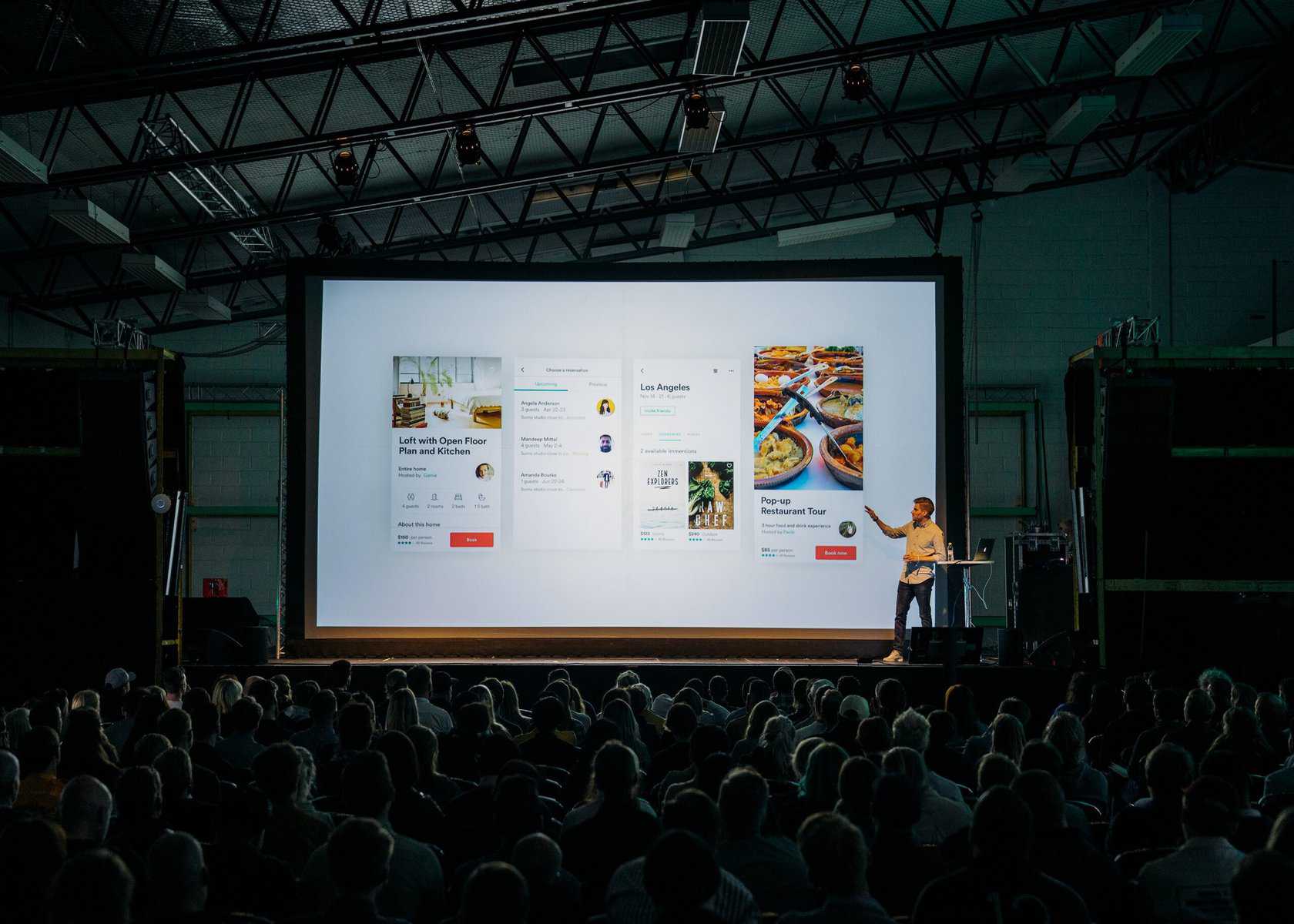
Symposium Committees
Local Organising Committee:
Anna Sturrock (University of Essex)
Rui Vieira (Cefas/University of East Anglia)
Tom Cameron (University of Essex)
Eoin O’Gorman (University of Essex)
David Murray (Cefas)
Joe Dawson (University of Essex)
Amy Shurety (University of Essex, Cefas)
Kirsty Bradley (Cefas)
Leanne Hepburn (University of Essex)
Paddy Keith (University of Essex)
Peter Betts (University of Essex)
Alice Malcom-McKay (University of Essex)
Domino Joyce (University of Hull)
Will Perry (Cardiff University Water Research Institute)
Chris Brodie (Liverpool John Moores University)
Scientific Advisory Committee:
Anna Sturrock (University of Essex)
Rui Vieira (Cefas/University of East Anglia)
Audrey Darnaude (CNRS, France)
Susanne Tanner (MARE, Portugal)
Ben Ciotti (University of Plymouth)
Ian McCarthy (University of Bangor)
Andreu Blanco (CETMAR, Spain)
Rachel Johnson (University of Caliornia Davis/NOAA, USA)
Martin Taylor (University of East Anglia)
David Bailey (University of Glasgow)
Ming-Tsung Chung (University of Taiwan)
Kim Birnie-Gauvin (DTU Aqua, Denmark)
Naiara Rodríguez-Ezpeleta (AZTI Basque Research and Technology Alliance, Spain)
Grant Stentiford (Cefas)
John Pinnegar (Cefas)
Logo designed by Phil Lamb (Cefas)

The 2023 FSBI Symposium is proudly co-convened by


And sponsored by
